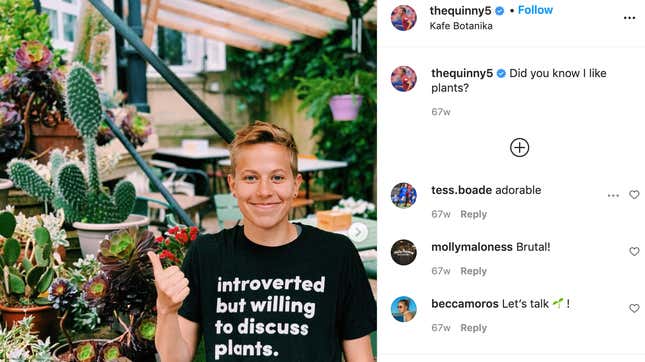
On Wednesday night, soccer star Rebecca Quinn announced to the world via Instagram that they are transgender. Quinn plays midfield for the NWSL’s OL Reign, Canada’s Women’s National Team, and is an Olympic bronze medalist; they are the first out transgender player on either team. While Quinn’s announcement is a proud moment that will likely pave the way for future generations to self-identify, an ugly question now looms. Will soccer accept them as they are?
Thanks to the tireless efforts of its players, the NWSL of today is largely supportive of its lesbian and bisexual members, but many fans haven’t forgotten about the division in the league just five years ago between Christian and queer players. But the league and the Canadian national team are now confronted with how to navigate the strict adherence to the gender binary within the sports community and whether or not that leaves a spot on the teams for Quinn. It will fall at the feet of NWSL Commissioner Lisa Baird, who will decide whether all the rainbow gear the league pumps each June is just for show, or if the league will keep a stellar transgender player on the roster.
Quinn was chosen to represent their native country on the Canadian National Team for the now postponed 2020 Olympics. However, the International Olympic Committee is notoriously clueless as to how to treat athletes who are trans or gender nonconforming. The most recent and painful example of this is Caster Semenya, a South African women’s track star who has been penalized by the governing body of her sport because of a genetic condition in which her body produces more testosterone than the “standard female range,” according to the New York Times. As Jezebel previously reported, the ruling preventing Semenya from competing which “tied women’s eligibility to their testosterone levels” was upheld once again on Tuesday and will likely become standard practice.
The Times speculated that the IOC would adapt a similar policy for all women competitors (as dictated by the IAAF) for the 2020 Olympics but Pink News reported that the IOC has yet to offer updated policy for trans and gender-nonconforming athletes. The policies currently in place could greatly hinder Quinn’s shot at returning to the Olympics in 2021. According to Pink News, “a consensus statement published in 2015 allowed trans women to compete in female categories under a series of conditions, which included the athlete publicly declaring that their gender identity is female, with the declaration unable to be changed for a minimum of four years.” There are also specific requirements as to how much testosterone can be present in the body in order to be cleared to compete.
In Quinn’s public announcement of their trans identity, they didn’t make mention of testosterone or give any glimpse into their journey towards coming out, and it is important to note that they are not obligated to do so. There could very well be a future in which Quinn and other trans athletes are not grilled about every aspect of their gender before being allowed to play a sport they’ve been excelling at since childhood. But sports governing bodies would have to pull themselves into this century for something like that to happen. We’ll see if the shift comes quickly enough for Quinn.